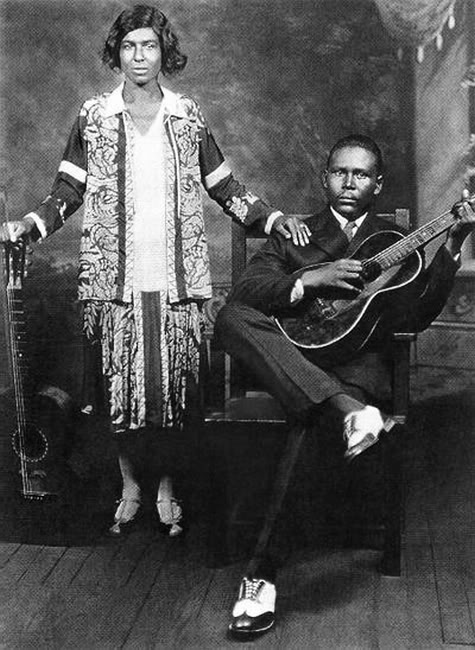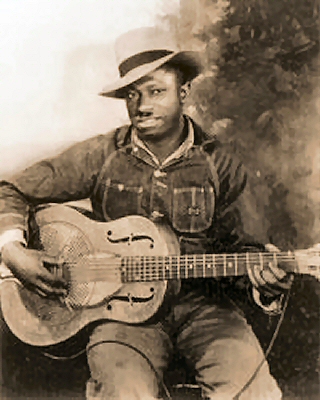<Back to Index>
- Bluesman Kansas Joe McCoy, 1905
- Bluesman Willie Love, 1906
- Bluesman Robert Petway, 1908
PAGE SPONSOR


Kansas Joe McCoy (May 11, 1905 – January 28, 1950) was an African American Delta blues musician and songwriter.
McCoy played music under a variety of stage names but is best known as "Kansas Joe McCoy". Born in Raymond, Mississippi, he was the older brother of the blues accompanist Papa Charlie McCoy. As a young man, McCoy was drawn to the music scene in Memphis, Tennessee, where he played guitar and sang vocals during the 1920s. He teamed up with future wife Lizzie Douglas, a guitarist better known as Memphis Minnie, and their 1929 recording of the song "Bumble Bee" on the Columbia Records label was a hit. In 1930, the couple moved to Chicago where they were an important part of the burgeoning blues scene. Following their divorce, McCoy teamed up with his brother to form a band known as the Harlem Hamfats that performed and recorded during the second half of the 1930s.
In 1936, the Harlem Hamfats released a record with the song "The Weed Smoker's Dream" on it. McCoy later refined the tune, changed the lyrics and titled the new song "Why Don't You Do Right?" for Lil Green, who recorded it in 1941. It was covered a year later by both Benny Goodman and Peggy Lee, becoming Lee's first hit single. "Why Don't You Do Right?" remains a jazz standard and is McCoy's most enduring composition.
At the outbreak of World War II Charlie McCoy entered the military, but a heart condition kept Joe McCoy from service. Out on his own, he created a band known as 'Big Joe and his Rhythm' that performed together throughout most of the 1940s. The band again included his brother Charlie on mandolin and Robert Nighthawk on harmonica. In 1950, at the age of 44, McCoy died of heart disease in Chicago, only a few months before his brother Charlie. They are both buried in Restvale Cemetery in Alsip, Illinois.
Led Zeppelin vocalist Robert Plant took his and Memphis Minnie's recording of "When the Levee Breaks," which was in his personal collection, and presented it to guitarist Jimmy Page, who revamped it and slightly altered it lyrically, and help record it on Led Zeppelin's 1971 album, Led Zeppelin IV.
In addition to those mentioned earlier, McCoy's songs have also been covered by Bob Dylan, John Mellencamp, The Ink Spots, Ella Fitzgerald, Jo Ann Kelly, Cleo Laine and A Perfect Circle.
McCoy also performed and recorded under the names Bill Wither, Georgia Pine Boy, Hallelujah Joe, Big Joe McCoy and His Washboard Band, and The Mississippi Mudder. Other names he used from time to time included Hillbilly Plowboy, Mud Dauber Joe and Hamfoot Ham.
Like many blues musicians of his era, Joe McCoy's grave site is currently unmarked. A tribute concert took place in October 2010 to celebrate the music of Joe and his brother Charlie and to buy gravestones for each of them.

Willie Love (November 4, 1906 – August 19, 1953) was an American Delta blues pianist. He is best known for his association with, and accompaniment of Sonny Boy Williamson II.
Love was born in Duncan, Mississippi, and in 1942, he met Sonny Boy Williamson II in Greenville, Mississippi. They played regularly together at juke joints throughout the Mississippi Delta. Love was influenced by the piano playing of Leroy Carr, and adept at both standard blues and boogie - woogie styling.
In 1947 Charley Booker moved to Greenville, where he worked with Love. Two years later, Oliver Sain also relocated to Greenville to join his stepfather, Love, as the drummer in a band fronted by Williamson. When Williamson recorded for Trumpet Records in March 1951, Love played the piano on the recordings. Trumpet's owner, Lillian McMurray, had Love return the following month, and again in July 1951, when Love recorded his best known number, the self - penned, "Everybody's Fishing." Love played piano and sang, while the accompanying guitar come from Elmore James and Joe Willie Wilkins. His backing band was known as the Three Aces. A further studio session in December 1951 had Love backed by Little Milton (guitar), T.J. Green (fiddle), and Junior Blackman (drums). In his teenage years, Eddie Shaw played tenor saxophone with both Milton and Love.
Under his own name, Love did not return to the studio until March 1953, when he cut "Worried Blues" and "Lonesome World Blues." Despite the friendship between them, Love did not utilise Williamson's playing on any of his own material. In April 1953, Love and Williamson recorded in Houston, Texas, but it was Love's final recording session.
Love played piano on Williamson's albums, I Ain't Beggin' Nobody and Clownin' With The World (1953). All of Love's own recordings appeared on the compilation album, Greenville Smokin', issued in 2000.
After suffering the effects of years of heavy drinking, Love died of bronchopneumonia, in August 1953, at the age of 46. He was interred at the Elmwood Cemetery in Jackson, Mississippi.

Robert Petway was an African - American blues singer and guitarist.
Very little is known about Robert Petway. His birth place is speculated to have been at or near J.F. Sligh Farm near Yazoo City, Mississippi, birth place of his close friend and fellow bluesman Tommy McClennan. His birth date is guessed at 1908, and the date and even the occurrence of his death is unknown. There is only one known picture of Petway, a publicity photo from 1941. He only recorded 16 songs, but he is said to have been an influence on many notable blues and rock musicians, including John Lee Hooker, Muddy Waters, and Jimi Hendrix.
Like many bluesmen from the Mississippi Delta, Petway traveled around as a musician, playing at parties, roadhouses, and other venues available. Petway and McClennan often traveled and performed together. After McClennan had been in Chicago for a few years, Petway traveled north to join him and cut records, as did Georgia's Frank Edwards who met them in Mississippi.
One of Petway's most influential songs is "Catfish Blues", which he recorded in 1941. Muddy Waters used the lyrics and style of "Catfish Blues" for his first single "Rollin' Stone", the song from which the rock group The Rolling Stones chose their band name. There is debate on whether Petway deserves any credit for the Muddy Waters song, mostly stemming from the fact that blues musicians often borrow lines and verses from each other and often use common symbols and phrases that can not be traced back to one source. There is even some speculation that Tommy McClennan wrote the version that Petway recorded. Max Haymes has written a well researched article, "Catfish Blues (Origins of a Blues)" on the topic, available at earlyblues.com. When David "Honeyboy" Edwards, a follower of Petway, was asked if Petway wrote the song, he replied, "He just made that song up and used to play it at them old country dances. He just made it up and kept it in his head."
Second verse of "Catfish Blues"
What if I were a catfish, mama
I said swimmin’ deep down in, deep blue sea
Have these gals now, sweet mama, settin’ out,
Settin’ out hooks for me, settin’ out hook for me
Settin’ out hook for me, settin’ out hook for me
Settin’ out hook for me, settin’ out hook for me
First verse of "Rollin' Stone"
Well, I wish I was a catfish,
swimmin in a oh, deep, blue sea
I would have all you good lookin women,
fishin, fishin after me
Sure 'nough, a-after me
Sure 'nough, a-after me
Oh 'nough, oh 'nough, sure 'nough
There is no record, official or unofficial, of Petway's death. As such, he may still be alive, though he would be roughly 103 years old. The last record of his public life is a quote from Honeyboy Edwards: "nobody I know heard what become of him." Blues researcher Jason Rewald has suggested, on the basis of social security records, that Petway may in fact have been born in Gee's Bend, Alabama on October 18, 1907, and died in Chicago on May 30, 1978.